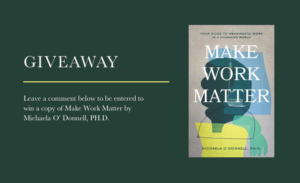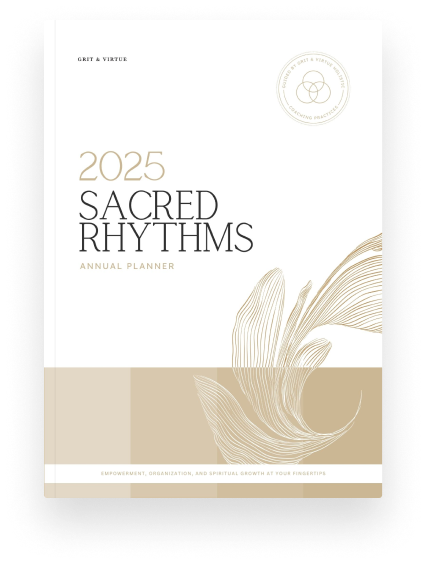Right now, a staggering number of people are considering quitting their job.[1] In fact, experts are calling this time The Great Resignation. [1] Let’s face it, the pandemic turned our world upside down. Even if you’re not wanting to change jobs or start something new, you might be thinking about other types of work transition: where you do your work from, the hours you work, or the kind of company culture you want to be part of.
Let’s face it, the pandemic turned our world upside down. If your feelings about work are in flux, you’re not alone. In my role at the Max De Pree Center for Leadership, I talk to people about their work…a lot. Since the beginning of the pandemic, I’ve heard the following themes in people’s stories:
- For some, work-from-home became work-all-the-time. When you’re always available there’s pressure to be always on. Now, we just need to rest and recover.
- For others, we like the flexibility of working from our couch. Now that our companies want us to come back to the office, we find ourselves resistant to go back to the way things were.
- We had a lot of time to think about what really matters to us. We realized work felt futile or that our bosses were kind of a headache. Now, we want more. We need more.
My new book, Make Work Matter: Your Guide to Meaningful Work in a Changing World, is a guidebook for the (often day-by-day) process of discovering meaningful work in a changing world. Below, I’ve summarized parts of the process for you.
-
Reflect on the Road Thus Far.
Maya Angelou says, “You can’t really know where you are going until you know where you have been.” It’s true, isn’t it? In order to envision what might be and where we might go, or even why we might stay, we’ve got to get clear about what’s already happened. Let’s call this remembering.
Of course, the Bible has a lot to say about remembering. God is particularly clear with the Israelites at various junctures that they would do well to remember how God delivered them from oppression (Deuteronomy 6:12) and that God was with them as they wandered in the wilderness (Deuteronomy 8:2). We take this as evidence that when we’re in a tough place God is with us too (Psalm 23).
I find it helpful to reflect on where I’ve been by actually drawing my road of calling as I remember it. Draw your own road, including significant-to-you milestones in your life that have led you to where you are today. As you do so, consider the shape of your road and key milestones along the way. If there have been many pivots and surprises, maybe your road has a dozen switchbacks. Or if your journey has felt especially difficult, maybe set it on the side of a steep mountain. I’ve had people tell me that they picture actual roads they know well—the road their childhood house was on or the road they now run on. Really visualize it. Take your time and draw all the way up until the present day.
-
Now, Try and Name Where You’re Stuck.
Now that you’ve spent some time remembering how God has brought you to where you are today, see if you can name ways in which you feel stuck today. What I’ve learned is that we all have ways we feel stuck, even if they are a few layers beneath the surface. I usually need help getting at these deeper layers. To do that, I’ve come up with an exercise. There’s a more detailed version of it in Make Work Matter, but I’ll provide an abbreviated one here.
Ask yourself the following questions, writing down your responses. Where do I have frustration in my current role, disappointment with work, or even pain? You may have many things that surface, or just a few.
Then ask: what do these frustrations, disappointments, or pain reveal about what I’m longing for? You may have many longings that come up, or just one.
I have witnessed over and over that meaning comes to those who are willing to do the complicated inner work of getting in touch with their longings so that they can grow in attunement to the day-by-day graces of God on whatever road they are traveling.
-
Identify and Take Next Doable Risks.
After you hear yourself describe what it is you are longing for, a natural next step is how to take that sense of longing to God as you start to discern the next steps. This might lead you right back to “Should I stay or should I go?” Or you might feel much more confused. I have found that clarity in pursuit of longings often comes not just through thinking about what we might do, but through taking small, doable risks that start to stack up toward something meaningful.
When we think about risks, we tend to imagine the big, hairy, scary choices that can either make or break us. Moving to a new city where you don’t know anyone. Quitting a job you love to work at a new place you hope will advance your career. Taking out a loan to start a new business. Going back to school to change career paths.
While it’s certainly true that sometimes God compels us to take big risks, most of our daily lives don’t play out in such a grand fashion. Consider the opportunities for risks that have presented themselves over the past week or month. Maybe there was a chance to speak up in a meeting? Or maybe you thought about drawing an after-office boundary with your boss? Or saying yes to a new type of project?
Now, think about your upcoming week. Can you identify the next doable risk that you want to take in your work? Maybe it’s related to, “Should I stay or should I go?” Or maybe it’s something different.
Even if you’re not considering leaving your job, remembering the road thus far, naming where you’re at now, and charting out the next doable risks can be a powerful way to consider how you approach your work and how that work is part of the big work of redemption, justice, and peace that God is up to in the world.
- How has The Great Resignation affected you?
- What is one doable risk you can take right now as you consider what is next?
Share your answers with us in the comments below to be entered to win a copy of Make Work Matter: Your Guide to Meaningful Work in a Changing World by Michaela O’Donnell. The winner will be announced in our next newsletter. Don’t get our newsletter? Sign up here!
Notes
[1] Gallup estimates that 48% of people are thinking about quitting their jobs. https://www.gallup.com/workplace/351545/great-resignation-really-great-discontent.aspx
Enjoyed it? Share it!
Michaela O’Donnell
Dr. Michaela O’Donnell is the Executive Director of the Max De Pree Center for Leadership where she oversees the center’s vision, strategy, program, and team, all with the goal of helping leaders respond faithfully to God in all seasons of their life and leadership. Michaela regularly writes and teaches on topics of vocation, change, innovation, creativity, faith/work, and gender dynamics. Her first book, "Make Work Matter: Your Guide to Meaningful Work in a Changing World" was recently published with Baker Books.
But wait, there's more...



















So thankful for this word from Michaela! I’ve definitely had to rethink my work patterns and create new ones that were more sustainable and effective.
This is interesting! I have been thinking about this since the pandemic!
The quarantine, enforced due to the pandemic, has completely changed how I think about achieving my professional goals. The slower pace of life has forced me into a stage of self-discovery; it’s time for me to rest and time to access my dreams. This article is helpful. I’m going to add the information from this article to the material that I’ve been using to help guide me through this new stage of self-discovery.
Great article! Definitely want to read the book
I found with seeing so many colleagues moving jobs, resigning, and moving on, I began to look at my own job and wonder if there were something else that I could be doing, a way to start over with better boundaries from the beginning, and a way to manage a newborn with work life.
One thing I’ve started to do to which seems like a very doable risk, is connect with some recruiters and professional contacts to see where there may be openings and ask some questions about their jobs, what work is like
A risk I’ve needed to take is showing honest vulnerability at work. And then doing the hard work to let go of things sometimes and ultimately remember to surrender the plans to my Creator!
The Great Resignation significantly changed my workplace, as a nurse. Everything is different from staffing to protocols. A risk I’ll be taking in December is an alternate schedule with different hours in hopes of balancing family life as a new mom with career passions.
Thank you for stepping out in boldness and obedience to address this topic among countless others. All of this spoke directly to me, and I’m grateful for you all of you at Grit & Virtue!
I have noticed that the Great Resignation has affected all of our lives in one way or another. I saw people on my “new” job (a month before March 2020) resigning shortly after I started. A lot of people changed jobs or started a new business as well, making going out to a local restaurant for sit down dinner different due to the shortage in staff.. and at times patience.
Thank you for sharing this message.
I am currently in my last year of teacher’s college and I am already facing feelings of frustration with not having enough time to learn and do all of the things I want to do to be a good teacher. After reading this article and diving deeper into why I feel these frustrations, I realize it is because I want so badly to be a good teacher. To impact students and make a difference, and unfortunately to look good to everyone else. This realization was eye-opening to me, I didn’t realize how much focus and longing I was placing on looking like the “perfect” teacher.
Within the next year, my life will be consisting of taking a lot of big risks, like moving to a new city and starting a new job hopefully. So, I am really working to trust God through it all that He has His hand in it all for His glory! Not an easy thing to do for someone who is a bit of a control freak, but I am starting to find real freedom in releasing control and finding the peace God gives so freely! Thank you for addressing this topic, and guiding me to see the beauty in the hardships of life and work.
The pandemic has caused me to grow deeper in knowing Jesus, in really standing fast in His promises, and even learning how to build myself up in the Lord when I was alone. It also challenged me to be more encouraging in my relationships and at work to not take them for granted and try to brighten everyone’s day that I passed by.
I am taking the risk to wait with courage as I explore the next steps in moving to a new state and a applying to jobs knowing God will lead me by His right hand, as everything unraveled days after I moved here.
My Great Resignation was thrust upon me – as a solo parent, I could not continue working during the pandemic and provide all the care my child (rare genetic disorder/multiple disabilities/ medically-fragile/mental health issues) required since school was virtual and her therapists could not provide services. GOD said it was time to go and grow …
Great article and topic indeed. I’m guessing maybe for me it seems that wanting a change is so significant because I am hoping to separate myself from the hardship of going through the pandemic and all the adapting that had to be done. Im tired and starting fresh at a new job seems to be the most appealing way to do be refreshed and energized again. But, I also don’t believe getting stuck in a learning curve for a new job when I could have faced that in my current job makes the most sense either. I am surrounded by people I truly care about and I know they care about me so I want to remain loyal to that as well as not get stuck somewhere else where the culture is stagnant because then I’ll be faced with regret. I’m not sure what to do but at least this article helped me process for starters and at least acknowledge it in these comments. Thank you for the challenge to post. The book sounds like a timely read. I’m currently also reading Soul Keeping by Jon Ortberg for the 3rd time, love it so much!
Super helpful article and I appreciate the attributed links. Thank you!
The past year has definitely made me re-think my career goals and how they fit into my overall life goals. Instead of work goals and personal goals as separate, I’ve seen how these are connected and, in turn, how they change in outcome of my goals when connected. Maybe this is a natural process that has increased in speed due to the nature of the pandemic? A risk for myself this season is being honest with my career and personal goals. Then when being honest, evaluate if the situation I am currently in is propelling me towards those goals or if a change is needed.
Sheesh~ you got me in tears. Thinking about the past got me sad. Remembering the burnouts and overworking and giving up after that. Its painful, but a good reminder that Gods been with me and I’ve come a long way. The Great Resignation affected me because I left my moms business to go and have faith to go back to school (for bachelors in social work) and join the dance community. I think G.j od is also calling em to be an entrepreneur at this time. But I am scared and I fel bad for leaving my moms to do my own. She needs help and I left. Makes me feel like a losy daughter, but it’s not the best environment for me to finish school and dance in. I came here with no job and little bit of money. I couldn’t find a job so I went bavk and forth from MD (where my moms business is in) to VA (where my school is). I was tired and drained. Then I found a part time job to later be let go. So I’m back at square one. I realized that I need a job where I still have time to workout, cook, steward relationships, train, and go on hikes. I want to work with girls or woman. A risk I can take right now is to not quit being in VA. I shouldn’t retreat home. And if I do go home it’s for a week tops and its family time. I should finish the websites for my businesses.
The Great Resignation hasn’t really affected me. My husband teaches at a small private school, and he is absolutely where God has called him to be. I work for a state agency, and I’m the benefit carrier and primary breadwinner for our family. I’ve said that I’m thankful God has put me in a position that allows my husband to be where he’s called to be without us having a lot of anxiety about how bills will get paid. (I’m not rolling in the dough, but I make decent money.)
But where I am is not where my heart is. I do editing and proofreading as a side hustle. If I could find a way to do that full time from home, to where I don’t have to cross an anxiety-inducing bridge to and from work every day, I would jump on it in a hot second. However, I’m not in a position where I can just quit where I am and go out on a limb. For me, it’s a conundrum.